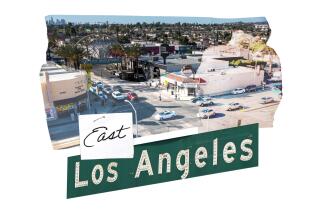Assemblywoman Helps Pressure Council : Lynwood Shelves Annexation
LYNWOOD — The City Council, yielding to pressure from Assemblywoman Maxine Waters (D-Los Angeles) and some of her angry constituents, Monday voted to drop plans to annex 80 acres of unincorporated county land next to the city’s western boundary along Alameda Street.
Waters, whose 48th Assembly District includes both Lynwood and the unincorporated land next to Watts, had accused the council of wanting to take the land and allow half of it to be used for construction of a county jail.
The annexation “would displace over a thousand people living there, and a jail would be built that the people do not want,” Waters said in an interview.
Without allowing Waters to speak, the council voted unanimously to terminate all annexation proceedings that it started more than a year ago on the area north of Imperial Highway.
“The people have won. They (the five-member council) don’t want to fight. Let’s go,” Waters said to about 40 residents and supporters who had jammed the tiny council chamber.
Crowd Was Unexpected
The council had called the special Monday meeting to take up the annexation question after “a busload of angry people showed up to protest” during its regular meeting Nov. 19, Councilman Robert Henning said.
The unexpected crowd of more than 200 at that earlier meeting let the council know in no uncertain terms that people opposed the annexation and believed it was being carried out to build a jail. Council members denied that the land would be used for a jail or prison.
Before the council voted Monday, Henning told the audience, “No one has done anything for this area. It has been neglected. By bringing it under city government, everyone will benefit. The land can be developed. The people can use the city schools. (Federal) Housing and Community Development grants would be available. Building a prison hasn’t been discussed. This is the gateway to Lynwood. We are interested in developing it.”
However, Waters, during an interview, insisted that the city was supporting the idea of a county criminal justice center, which would include a jail.
Waters had a report from the office of the county administrative officer, dated May 29, 1985, and sent to all five county supervisors, which stated in part, “Unlike many cities in the county, the City of Lynwood is supportive of constructing a Justice Center which includes a jail in their community.”
Waters’ Scenario
Waters said Lynwood proposed to annex the land as part of its redevelopment program, acquire the property, and later transfer ownership of a portion to the county for the South Regional Criminal Justice Center.
But Councilman E. L. Morris said even though there were talks with the Sheriff’s Department and city officials about the sheriff’s desire to have a justice center, “there was never anything specific.”
“Somebody got to the people,” Morris said, “(and) misinformed them that the city was going to build a prison, take their homes from them. The city doesn’t build prisons.
“Political higher-ups, like Maxine Waters, are always saying how we should do more for blighted areas. Then she comes and puts the screws to it. In view of the upheaval she caused, we are not going ahead with it.”
No Funds for a Jail
Mike Henry, chief analyst in the county administrator’s office, said the county has no funds for a new jail, but it needs a facility and still hopes to build it sometime.
“There are 18,000 (inmates) in the county facility built for 11,000. We still need a site and are looking,” Henry said. “The board (of supervisors) is still looking for fundings, perhaps state bonds, for jail construction.”
The Local Agency Formation Commission, a county agency, would have had to grant approval of the annexation. State law also provides that if 50% of the registered voters who live in a proposed annexation area file written protest, the matter is to be terminated.
There are 345 voters in the area, 1,162 people and 305 dwellings, mostly single-family units, according to city information submitted to the formation commission. The area is bounded by Imperial Highway on the south, 108th Street on the north, Mona Boulevard on the west and Alameda Boulevard on the east.
More to Read
Sign up for Essential California
The most important California stories and recommendations in your inbox every morning.
You may occasionally receive promotional content from the Los Angeles Times.










